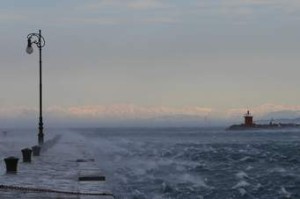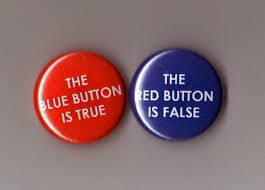Alitalia doesn’t let you choose your seats. It wasn’t a problem on the short flight from Trieste to Rome, but now, on the long flight from Rome to Los Angeles I find myself in the center aisle. Perhaps because I worked my way up to business class with frequent flyer points and not hard cash I don’t quite merit my preferred window seat, but I am not complaining. I am in the first row, and especially grateful for the 30 square feet of real estate, and especially the “lie-flat” seats that comes along with the business class fare.
In the center aisle I am almost robbed of the view out the window, but I can see enough to give me that jejune thrill a child has when riding his bicycle for the first time without thinking.
It is a beautiful, crisp morning at the Rome airport, situated well outside of Rome on the west coast of the Italian peninsula. We are departing to the north, or so it appears, although I thought I caught a glimpse of the number 27 roll by as we were slowly taxiing to the runway. That would mean we were actually departing to the west, which might be possible given the California-like, confusing northwesterly sloping coastline.
It has taken us a long time to taxi, probably indicating there were many flights queued up ahead of us, and given that we were awake at 3:30am in order to make our first departure from Trieste, I was just too tired to keep my eyes open to read during the taxi. So I surreptitiously plugged in my iPod and it graciously provided the soundtrack: Jimmy Buffett, Frank Sinatra, America, Jay and the Americans. This is how taxi and takeoff should be experienced.
Leaving Trieste is sad in an ineffable sort of way. Nothing sad here happened to me, with the exception of the mosquito bites, the few remaining signs of cancer, ridiculous quantities of carbohydrates and the impossibility of finding anything even resembling an American breakfast.
It was good to be away from the stage on which the last year unfolded. Yet, I am so looking forward to going home. Although it is going to be another stretch of PT/CT scans and doctor’s appointments, there really is no place like home, Dorothy. Nowhere that grants the illusion of safety better than the place I only part-jokingly say my wife built.
We are lined up now with the center line, so we are number one for departure. The gargantuan Pratt and Whitneys roar to life and I imagine the pilots, only about 15 feet in front of me, hand over each other’s hand, pushing the throttles all the way forward, their other hands gently cradling the yoke while they guide the Boeing down the runway with their feet. Sure, I would rather be up there, but it is so much less stressful back here. Go Alitalia, I think, and leave the driving to them.
I don’t know what kind of trees I am seeing out the window, but they are lined up too neatly to have been planted by nature. Their canopy sits awkwardly on top of their straight trunks, with twisted branches like the Baobob tree gracing the cover of many a St.-Exupery “Little Prince” book. The whole 777 is vibrating and whirring now as it picks up speed down the runway, and the rows of trees seem to unwind past the window. In less than half a minute, the nose lifts off the ground haughtily, almost as if the big jet is smirking at the earth, saying “I don’t need you, buddy, any more than you need me.” I don’t think all airplanes would talk that way if they could, but this one would.
We climb, steadily, gently, but severely, out over the deep blue Tyrrhenian Sea, then, after a minute or two, turn left to chase the sun. We will chase it for 12 hours but never catch it, the earth spinning in the same direction in which we are flying. For many on this magnificent technological behemoth, this is the start of an adventure in a new, strange, English-speaking part of the world. For me, I am at once returning home and leaving Trieste behind. I wonder if I will ever return, and if so, what fragments of memory will bring tears to my eyes. And when I arrive home, what will spark the memories of Trieste’s sinuous streets, late-night strolls through piazzas, writing and drinking coffee in antique coffee shops, music, humidity, and an incomplete jigsaw puzzle? Ultimately I suppose it doesn’t matter whether we are here or there, because it is all part of the journey. And even if you are relegated to the center aisle, there’s still a lot to see.





